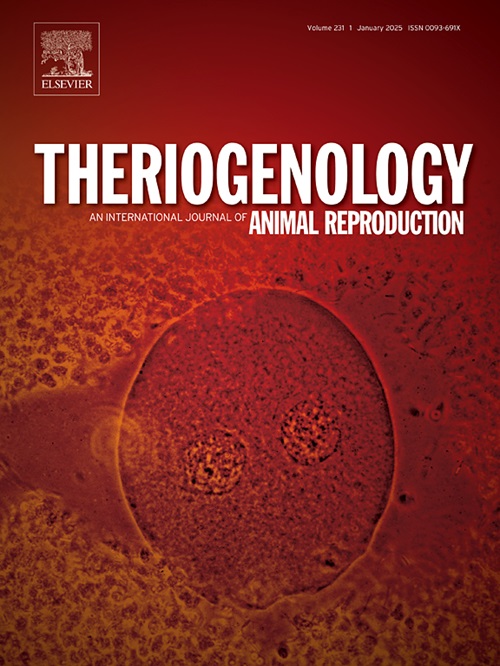父代反式脂肪酸和维生素 E饮食影响子代大鼠睾丸中雄激素信号通路基因的表达模式
IF 2.5
2区 农林科学
Q3 REPRODUCTIVE BIOLOGY
引用次数: 0
摘要
大量研究表明,父母饮食不当会对后代的健康产生负面影响。此外,母体饮食中的反式脂肪酸(TFA)对生育和健康的负面影响及其对后代的影响也有文献记载。然而,关于父亲饮食中的反式脂肪酸对男性子女的负面影响的研究却很有限。本研究采用 qRT-PCR 技术研究父代膳食中反式脂肪酸和维生素 E 对子代睾丸中 STAR、CYP11a1、HSD3B、SRD5a2 和 SCARB1 等雄激素信号通路基因表达模式的影响。本实验将亲代大鼠随机分为四组,每组十只,按以下方法喂养八周(60 天)。1:标准饮食加液体葵花籽油组(对照组)。2:标准饮食组,含反式脂肪酸(CTH)。3:普通饮食组添加 2.5 倍于推荐量的维生素 E 补充剂。4:补充维生素 E 和反式脂肪酸的标准饮食组(ETH)。然后使用 35 个后代的睾丸组织样本。提取组织中的 RNA 并合成 cDNA 后,使用实时定量 PCR 评估 STAR、CYP11A1、HSD3B、SCARB1 和 SRD5A2 等雄激素信号通路基因的表达水平。我们的研究结果表明,与CTH组相比,给予ETH的父代大鼠后代中CYP11A1的表达明显降低。与对照组相比,给予反式脂肪酸、ETH和维生素E的父代大鼠后代中STAR基因的表达水平明显较低。虽然CTH组的SCARB1表达量低于其他组,但差异无统计学意义。与喂食维生素 E + 反式脂肪酸或喂食含有反式脂肪酸的传统饮食的父代大鼠的后代相比,父代食用维生素 E 会大大影响 SRD5A2 的表达。此外,与其他组相比,维生素 E 组的 HSD3B 表达有显著的统计学增长。生物信息学分析(如蛋白质-蛋白质相互作用网络和基因本体术语富集)显示,这些基因在脂质生物合成、激素代谢、雄性性别分化、生殖发育和类固醇生物合成中发挥作用。我们的数据表明,父亲摄入反式脂肪酸会影响后代睾丸中特定雄激素信号通路基因的表达,而维生素 E 有可能减轻其中的一些影响。本文章由计算机程序翻译,如有差异,请以英文原文为准。
Paternal trans fatty acid and vitamin E diet affect the expression pattern of androgen signaling pathway genes in the testis of rat offspring
Numerous studies have shown that an improper diet in parents has a negative impact on offspring's health. Furthermore, the negative effects of trans fatty acids (TFA) in maternal diets on fertility and health and their impact on future generations have been documented. However, there is limited research on the negative effects of TFA in paternal diets on male children. The current work used qRT-PCR to investigate the effects of trans fatty acids and vitamin E in the paternal diet on the expression pattern of androgen signaling pathway genes such as STAR, CYP11a1, HSD3B, SRD5a2, and SCARB1 in offspring testes. In this experiment, parental rats were randomly separated into four groups, each with ten father rats, and were fed for eight weeks (60 days) as follows. 1: Standard diet group plus liquid sunflower oil (control). 2: Standard diet group containing trans fatty acids (CTH). 3: The regular diet group received 2.5 times the recommended quantity of vitamin E supplement. 4: Standard diet group with vitamin E and trans fatty acid supplementation (ETH). The testis tissue samples from 35 offspring were then used. Following RNA extraction from tissues and cDNA synthesis, quantitative real-time PCR was used to evaluate the expression levels of androgen signaling pathway genes such as STAR, CYP11A1, HSD3B, SCARB1, and SRD5A2. Our findings showed that the expression of CYP11A1 was considerably reduced in the progeny of paternal rats given ETH compared to the CTH group. The expression levels of the STAR gene were significantly lower in the progeny of paternal rats administered TFA, ETH, and vitamin E compared to the controls. Although the CTH group had lower SCARB1 expression than the other groups, the difference was not statistically significant. Paternal vitamin E consumption substantially affected SRD5A2 expression when compared to offspring of paternal rats fed vitamin E + trans fatty acid or those fed a conventional diet containing trans fatty acid. Furthermore, the vitamin E group showed a statistically significant increase in HSD3B expression compared to the other groups. Bioinformatics analyses, such as protein-protein interaction networks and gene ontology term enrichment, revealed that these genes play roles in lipid biosynthesis, hormone metabolism, male sex differentiation, reproductive development, and steroid biosynthesis. Our data indicate that paternal trans fatty acid consumption influences the expression of particular androgen signaling pathway genes in offspring testis, with vitamin E potentially mitigating some of these effects.
求助全文
通过发布文献求助,成功后即可免费获取论文全文。
去求助
来源期刊

Theriogenology
农林科学-生殖生物学
CiteScore
5.50
自引率
14.30%
发文量
387
审稿时长
72 days
期刊介绍:
Theriogenology provides an international forum for researchers, clinicians, and industry professionals in animal reproductive biology. This acclaimed journal publishes articles on a wide range of topics in reproductive and developmental biology, of domestic mammal, avian, and aquatic species as well as wild species which are the object of veterinary care in research or conservation programs.
 求助内容:
求助内容: 应助结果提醒方式:
应助结果提醒方式:


